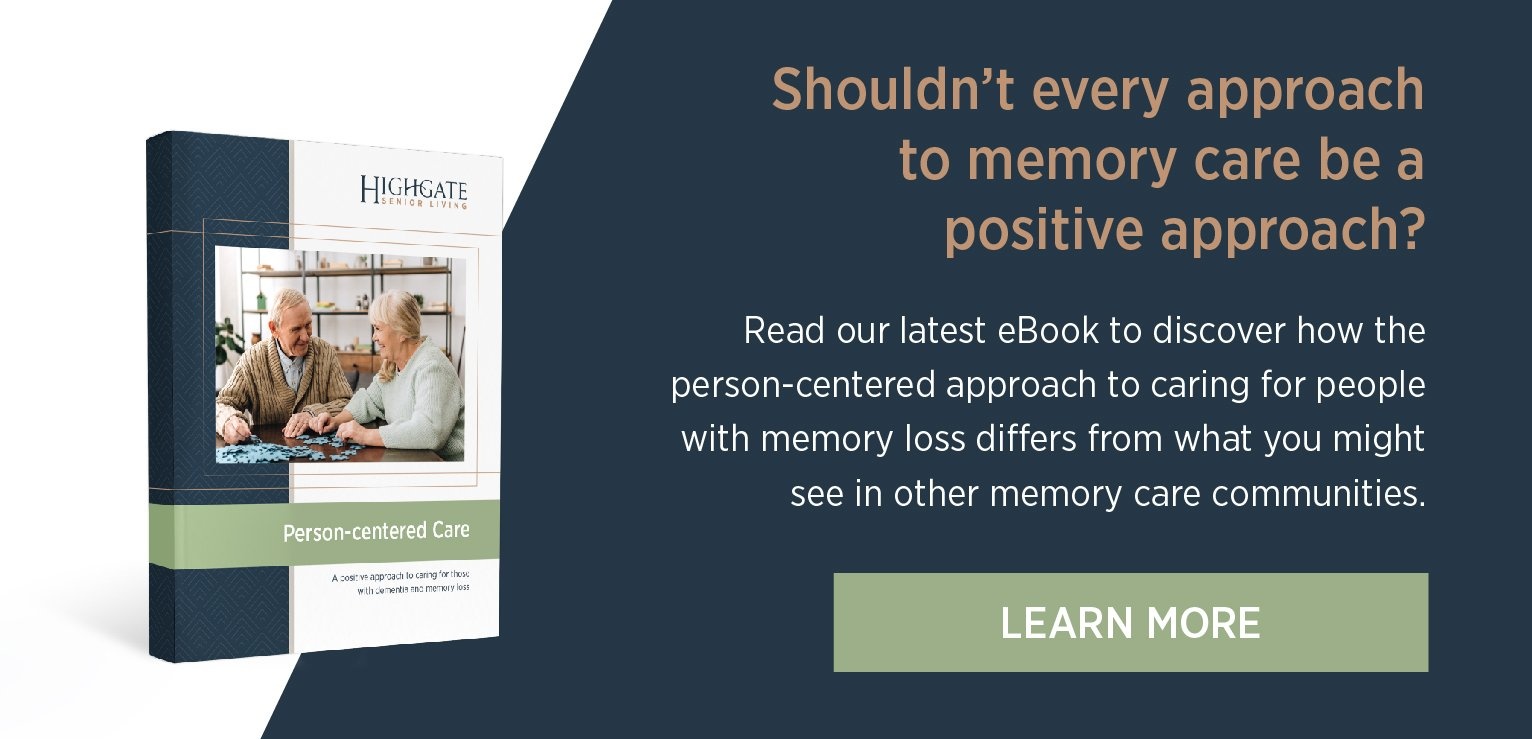
If you or a loved one has recently been diagnosed with dementia, you might be worried about how the disease and memory loss will affect quality of life.
Living with dementia will affect a person’s feelings, thoughts, and responses. Yet family members, caregivers, and health care professionals can help preserve their sense of identity and promote independence, creating an environment they can thrive in.
According to survey data and interviews from individuals living in the early stage of Alzheimer’s or with other dementias conducted by the Alzheimer’s Association, person-centered care techniques are key to supporting them in living life to the fullest. Championed by internationally recognized dementia practitioner, educator, and founder of the Positive Approach to Care, Teepa Snow, person-centered care is a positive approach to caring for those with dementia and memory loss that addresses each person’s unique experiences and needs.
“There is life after diagnosis, and I have learned to live life to the fullest,” said one individual living in the early stage of Alzheimer’s.
The person-centered approach is contrary to a “one-size-fits-all” approach or even the traditional “medical model” of health care. For example, in the traditional model, care is focused on medical diagnoses, disability, and deficits, using standardized assessments and treatments. Using a person-centered approach, the focus is on the individual and their abilities, preferences, values, and needs. A diagnosis of dementia is only one of the key pieces to the puzzle, not the only one.
So what can you do to support a purposeful and meaningful life for someone with dementia? Here are five person-centered tips.
1. Maximize Independence
For those living in the early stage of dementia, the thought of losing your independence one day can be paralyzing, and from time to time, your loved one might feel overwhelmed by the sense of loss they are afraid of. As a loved one, it can be hard not knowing when and how much assistance to provide.
Although your goal is to be supportive, sympathy can drive you to want to do more than is actually needed. When driven by a person-centered approach, care and support are focused on what your loved one is capable of, not what they aren’t. Even though it might take them longer on different days to complete a task, allowing your loved one to complete tasks they can will leave their dignity intact and will give them a small sense of accomplishment.
Being allowed to participate and complete everyday activities for as long as possible — no matter how long it takes — gives your loved one the opportunity to improve their cognitive skills and potentially slow down their decline. As the saying goes: Use it or lose it. The same goes for cognitive function. The longer you actively engage your loved one, the better their chances are for maintaining and keeping their mobility, fine motor skills, and ability to think through the steps of a task.
During the early stages of memory loss, offer to help in moments of frustration, but avoid assuming your loved one would want you to do it for them.
2. Provide Opportunities for Meaningful Activities
According to researchers, living your life with a sense of purpose may help you live longer — no matter your age. Having a purpose in life leads to lower mortality risk across the lifespan and higher psychological well-being, such as positive relations and positive emotions.
For people with dementia, meaningful activities can be more than just hobbies and can include other things that your loved one does each day. Although doing housework may not sound like a fun activity to you, it can leave your loved one with a sense of accomplishment and leave them feeling that they’re still capable of contributing — all feelings that lead to having a sense of purpose in life.
In addition to feeling like you are contributing and have a sense of purpose, much can also be said about the power of positive thinking. Help by making time for activities that enhance their sense of connection to themselves, to nature, and to others. That might look like spending time in nature, dancing to a familiar song, or helping prepare a meal. Sensory activities are particularly good for soothing and relaxing.
3. Encourage Social Interaction
Humans are social creatures, and one of the most vital aspects of living well includes an opportunity to stay connected and engaged with others. This doesn’t change after a dementia diagnosis. But many people living with dementia may feel isolated or removed from their social networks.
To foster feelings of inclusion and acceptance, encourage your loved one to stay socially connected. Research shows that seniors with dementia who have a strong social support network experience delayed cognitive impairment.
Staying socially connected looks different for different people. It may mean staying involved in a church devotional group, visiting an adult day center or senior center for scheduled activities, or living in a memory care community that provides a safe and supportive environment for loved ones to interact with others.
4. Support Physical Activity
For individuals with memory loss, staying physically active might be your last concern. But without activities to keep your loved one up and moving, you might find that your loved one wanders later in the day, starts to withdraw from the outside world, displays signs of frustration or boredom, or has a hard time falling asleep at night (known as sundowning).
There is strong evidence from epidemiological studies that exercise or physical activity can also delay onset and progression of dementia in older adults. Staying active is essential to living well.
Incorporating regular physical activity for your loved one can help prevent frustration, boredom, and unexpected negativity. It also has been shown to improve memory recall for some older adults with memory loss.
Most often what prevents families from implementing an activity program at home is lack of guidance about what exercises are appropriate for their loved one or fear that physical activity will result in an injury or cause pain. This Physical Activity Planner for Memory Loss will help you navigate how to safely increase physical activity for people with memory loss.
5. Meet Your Loved One Where They Are
Over time, people with memory loss might struggle to find the right word to say, tell the same stories over and over, have difficulty recalling major life events, or find it difficult to find the words to express themselves, and eventually require more help from you.
Meet your loved one where they are. Focus on what they're capable of, not what they struggle with, when making a plan for supporting your loved one. Yes, you will need to help with some aspects, but intentionally focusing on what your loved one is capable of will ensure your plan for support is limited to what they need or have expressed they want help with.
Snow encourages caregivers to love and respect those living with memory loss for who they are now. People with dementia might not be able to plan activities or have the in-depth conversations with you that they once did, but every day is an opportunity to make new memories and cherish the time you have with your loved one.
A Guide to Person-centered Care
As a loved one of someone living with dementia and memory loss who wants to give the best possible care for them, learning how care providers are taught to support each person’s holistic needs and preferences can help you best support your loved one while they live at home.
Learn how person-centered care differs from the traditional approach to caring for those with memory loss and why caregivers (whether at home or in a communal setting) are using this preferred approach to support the ones they love. Check out this eBook: Person-centered Care: A Positive Approach to Caring for Those with Dementia and Memory Loss.






